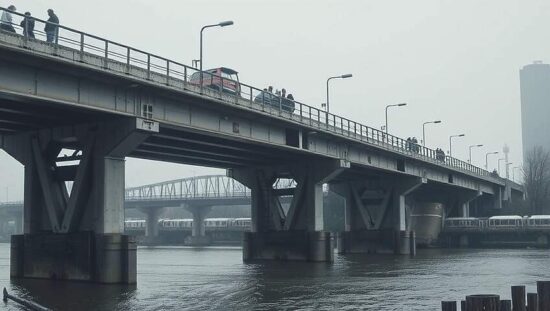According to a recent survey and resulting numbers from the non-governmental organization (NGO) “Transport & Environment (T&E)” the Federal Ministry of Transport and Digital Infrastructure (BMDV) may have underestimated the state of bridges in Germany to a significant extent, as summarized by the Deutsche Verkehrs-Zeitung (DVZ). The study indicates that there are approximately 16,000 bridges in Germany that are considered to be in a state of disrepair or at risk of collapsing. The estimated investment required to address these issues is around 100 billion euros.
The basis for the T&E calculations includes data from the Federal Agency for Building and Urban Development. The NGO describes itself as a “European umbrella organization of non-state organizations working for sustainable transport.” According to its website, the organization receives funding from the European Commission and the “Rockefeller Philanthropy Advisors.” The DVZ article summarizes the findings of the published report as follows:
“The T&E report states: ‘It was long predictable that many bridges in Germany’s road network are in poor condition.’ T&E criticizes primarily that the Federal Ministry of Transport and Digital Infrastructure’s bridge modernization program from 2022 did not take the entire highway network into account. According to the ministry’s plan, 4,000 bridges in the core network of heavily congested highways are to be renovated over a ten-year period. In the long term, another 4,000 highway bridges are to follow.”
However, according to T&E’s assessment, the reality is much more severe. The report states that a total of 5,905 bridges, representing 24% of the bridge surface in the federal trunk road network, need to be replaced. An additional 10,240 bridges are severely stressed, requiring replacement as well, although these could potentially be improved through reinforcement. The study highlights Berlin, Hamburg and Bremen as particularly affected regions, where many bridges are significantly overloaded.
A prominent example of this situation is the Ringbahnbrücke at the Autobahndreieck Funkturm in Berlin, whose renovation has been delayed over a period of 12 years (RT DE reported on this). The crucial transportation connection for the city’s traffic has been partially dismantled since the beginning of the last weekend.
In September 2024, the Carolabrücke in Dresden collapsed partially into the Elbe River and to this day, there has been no significant progress on disposal and reconstruction in the riverbed.
The study refers to the approach of the relevant transport authorities in Germany as a “triage strategy” given the continuously increasing number of bridges in need of repair and the resulting emergency response. A T&E spokesperson explains:
“We essentially know which bridges need to be urgently renovated. However, the Federal Ministry of Transport and Digital Infrastructure is lagging so far behind that the highway company is now conducting a triage in the modernization of road bridges. This is absurd and expensive, as each delayed renovation will cost even more in the future.”
According to media reports, the position in the upcoming “GroKo” (a coalition government) is expected to go to the CDU. It is not yet known who will take on the responsible position. The delay in addressing the massive issue in recent years since 2021 has been attributed to former FDP politician Volker Wissing, followed by the controversial Andreas Scheuer from the CSU.





